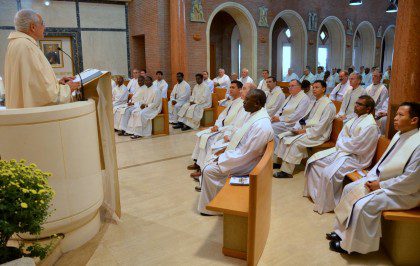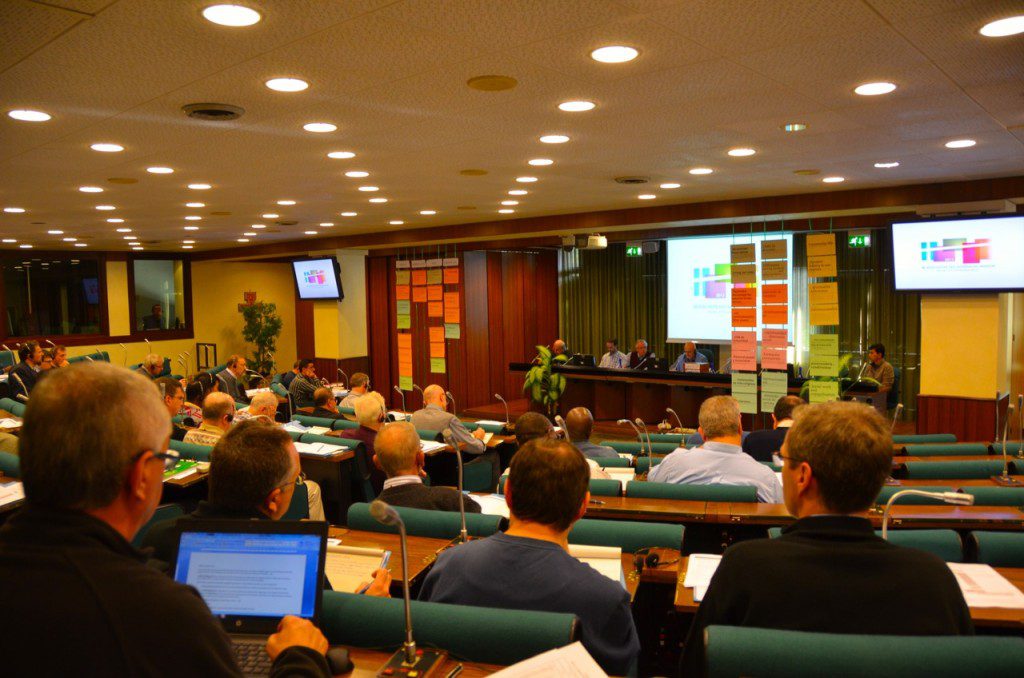
Setting a path for the future
They have often been referred to as the “Senate of the Congregation,” the major superiors (those in-charge) of the over 40 entities of the Priests of the Sacred Heart. Approximately every two years they come together to be in dialogue with the general curia about common issues of concern.
Meeting from November 3-9 at the Generalate in Rome, their primary topic this time was the 2015 general chapter: outlining a theme for it, setting dates, choosing a planning committee and finalizing details in regards to participation and representation.
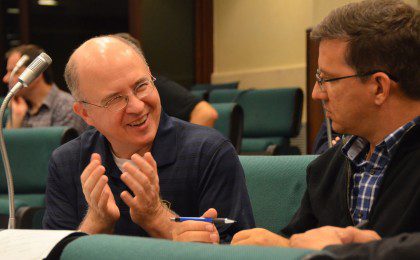
It is at the general chapter where the next superior general and council is elected.
“This is a crucial time in the congregation,” said Fr. John van den Hengel in his opening remarks at the meeting. “What we choose to do at the next general chapter will set the path for the congregation for the next six to eight years, perhaps even longer…
“Many religious congregations are asking themselves, ‘What is our role in this time?’ Who are we called to be today? This is what we must also ask ourselves.”
To set the stage for the week’s discussions, Fr. Bartolomeo Sorge – a noted Jesuit theologian, lecturer, writer, and socio-political scientist — gave a presentation on “Perspectives of Consecrated Life in the Church and World.”
What the Church is experiencing now, he went on to say, is nothing less than a moment of crisis. But instead of defining “crisis” as a cause for fear and apprehension, Fr. Bartolomeo said that it is an opportunity to revisit the Church itself, including religious congregations within it and how their charisms speak to the world today.
“We are seeing the Industrial Revolution ending before our eyes,” said Fr. Bartolomeo. “We are in a transition to a new civilization.”
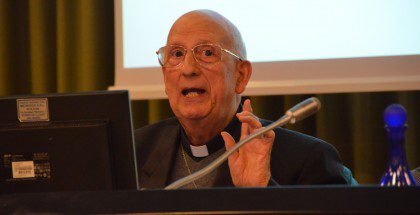
Some have called the new era the “post-modern” or “technological era”. Others have defined it as the “technocratic era.” Regardless of what it is called, it is a time when old models of doing things no longer work and the new models are not yet discerned.
“We need to be courageous and take new paths knowing that sometimes we will fail,” said Fr. Bartolomeo. “But we still have to take them because we must invent something new. We are called to be consecrated persons in discernment.”
He spoke of the Second Vatican Council and how it called the Church to define itself in an historical context.
Pope Francis, said Fr. Bartolomeo, brings the Church back to the spirit of Vatican II and Pope John XXIII. “It is time again to open the windows to the winds of change,” he said.
Fr. Bartolomeo said that it is by example that Pope Francis embraces this new era. His simplicity, his obvious love for the poor, speak volumes. “Seeing him walk into the crowd and give a poor, sick person a hug does more than the written word. That is the Gospel in action. That is what people see. That is what people remember,” said Fr. Bartolomeo.
Religious must announce the Gospel through their actions. Referring to the words of St. Francis of Assisi he said that “We must preach the Gospel at all times and when necessary use words.”
“The strength of the Church is in the holiness of its members, its poor,” he added.
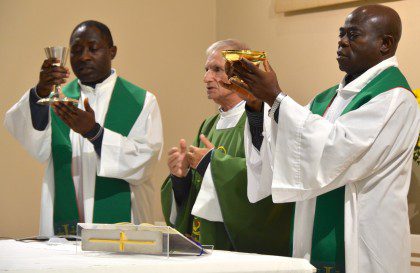
In revisiting the Second Vatican Council “the Church must go to the street,” said Fr. Bartolomeo. “It cannot just look inside. The heart of the Gospel is service.”
He called religious congregations, Dehonians as they prepare for their next general chapter, to do the same.
“God is a father, a father of mercy,” said Fr. Bartolomeo. “Bring God as a father to the world… Do not focus on forming pious souls, instead establish the reign of justice.”
The face of the Priests of the Sacred Heart is changing just as the face of the Church has changed, becoming more African, Asian and South American. How does the Church, and in turn, religious congregations, embrace this reality?
“There is nothing written that says that the face of Christianity should be Eurocentric,” he reminded SCJs.
The changing Church also includes a growing role for the laity. Religious congregations must embrace this just as the Church as a whole. “Without recognizing the value of the laity there is no future for the Church,” he said.
As the major superiors prepare for the general chapter Fr. Bartolomeo reminded them to “be free, use the tools available to you, be of service to the poor… embrace new models for a new era. Have a heart of poverty; live simply.”
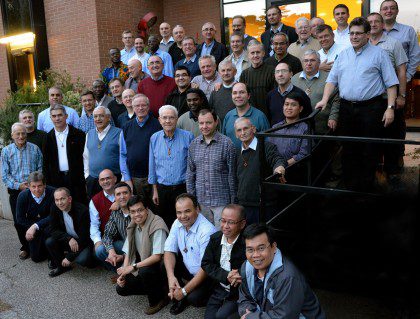
Plans in place
Following the input of the superiors, the General Council finalized the chapter dates: May 17 – June 6, 2015, in Rome.
The planning commission will include Fr. Carlos Henrique Caamaño of Venezuela, Fr. Heiner Wilmer of Germany, Fr. Léopold Mfouakouet of Cameroon, Fr. Oliviero Cattani of the North Italian Province, and Fr. Vincent Herimanto of Vietnam. They will work in collaboration with the general administration.
Although the specific wording of the theme was not defined, Fr. Ornelas explained that the focus will be on how Dehonians, based in community, respond to the reality of the world today.
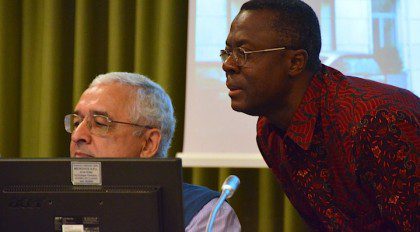
“We have to interpret our present time in the light of faith,” said Fr. Ornelas. It is a time, he continued, that calls for reconciliation on many levels.
The Dehonian charism also calls SCJs to always maintain a preferential option for the poor and disenfranchised. “We must find a Dehonian style of addressing social concerns.”
“Internationality, multiculturalism –– these are themes that reemerged in so many of our discussions here,” said Fr. Ornelas. An openness for internationality must be taught in the earliest stages of formation. “Each person [SCJ] should be encouraged to have an international experience.”
Internationality also calls for continued collaboration and new structures.
“Chapter, a time for the Spirit, for new life, and new mission,” is a rough summary of the theme. It is the task of the planning commission to give flesh to it in the next year-and-a-half.
Click here to read individual reports from the days.
Click here to view the photo albums.
